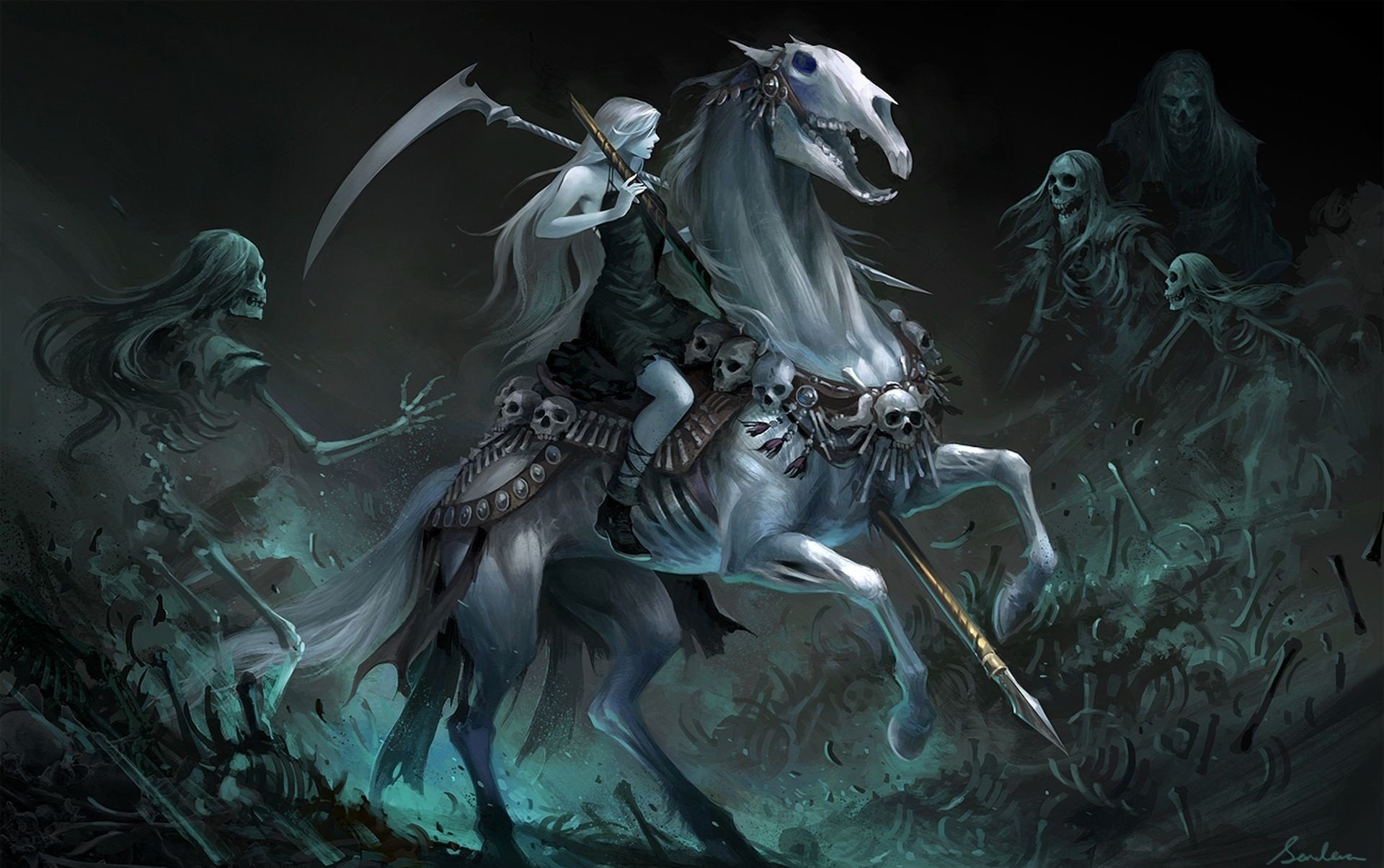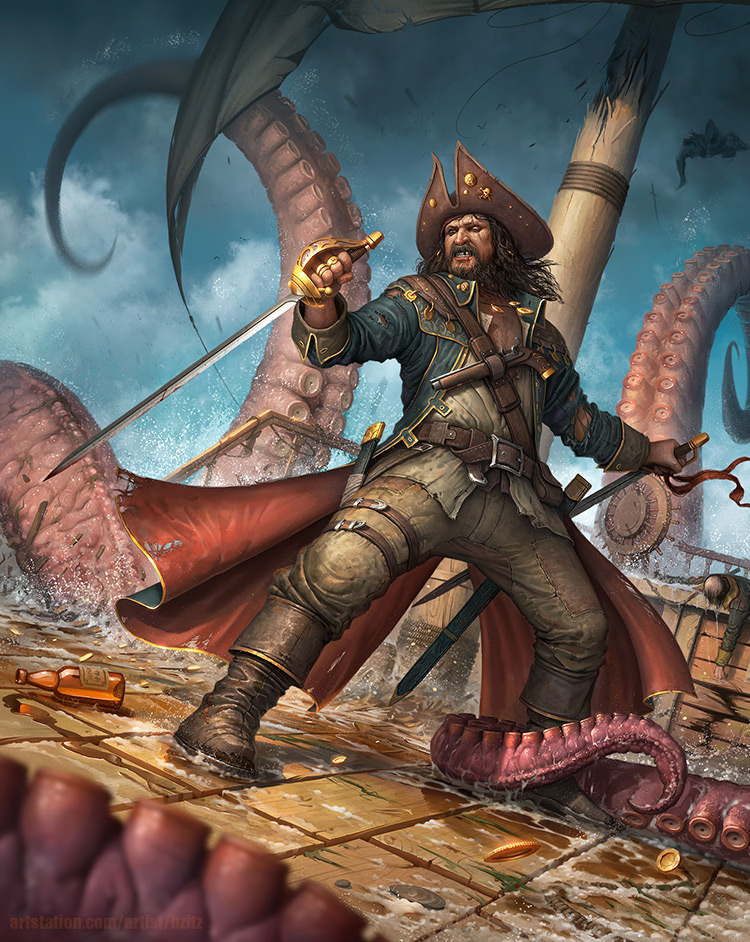Lord
A human with spiky red hair stands in front of his army, his troops facing opposite another military, a vast desert separating the two groups. The man leaps onto his black horse, draws a blade, and points it towards their foes, charging with his allies right on his back.
A goblin with black robes depicting symbols of a dark god runs through the streets, carrying a stolen spellbook - one he just snatched from a wizard, containing secrets relating to necromancy. Then, from the sky, an elvish woman on a skeletal horse descends, plunging her lance right into the goblin - the dead will not be forced to come back this day.
The dock never knew what hit them; a band of pirates lead by a woman on a screeching baby kraken was the last thing anyone would've expected, but as cutlasses clashed with spears of the guards, and gold was pilfered by the hundreds, it was clear that it was the reality of the situation.
Lords are those that hold some sort of reign over some part of reality - the most common being actual countries or other civilizations that are governed by royalty, but they are not necessarily always of regal blood; many lords are the leaders of mercenary guilds, bandit camps, and other organizations that require a leader to give orders and move about quickly.
Lords and their Mounts
A mount, to a lord, is not just a vehicle or a way to get by - for most, their mount is akin to a comrade in battle, one that helps keep the lord alive, and in return, the lord defends their mount to the best of their ability. Without a faithful steed, a lord would be nothing more than a persuasive fighter, but with a mount, they are able to move about as quick as an arrow, striking their foes in key points, and guide their allies to victory.
The most common mount for a lord to ride on would easily be the horse, however, the mounts of lords--much like lords themselves--come in all shapes and sizes; a lord that comes from a swamp might have bonded with a giant frog that leaps about the battlefield instead of galloping, and a lord that is connected with the arcane arts might even have a sentient throne that they sit upon, as magic compels their chair forwards.
Some lords might be less married to a specific steed, and instead prefer to constantly change out their war beast for whichever would fit the situation best - however, such lords lack the kind of close bond that can really bring one lord above the competition.
Creating a Lord
As you create your lord character, think about what exactly it is that your character is a lord of. Might your character be a noble that owns a manor, or the child of a king of a country? Or do your tie your origins to something less regal, like being the chieftain of a tribe, or a trusted advisor in a mercenary camp? You might even be less of an official leader, but rather, your charisma combined with your mount makes you an effective lord.
Furthermore, think about what sort of connection you share with your mount, if any - did you have a specific reason for picking the steed that you ride with, such as it saving your life? Or do you simply go with whatever random mount you can find at a moment's notice?
Ask your DM about how lords are seen in your campaign world; does the noble bloodline or mercenary camp you rule over have deep ties into the politics of the setting? Might your tribe be exploited by those with far more power than them? If you are no longer part of what you once ruled over, was it from an enemy attack - and if so, are there ruins left?
Quick Build
You can make a lord quickly by following these suggestions. First, put your highest ability score in Charisma, followed by Strength. Second, choose the noble or outlander background. Finally, choose a lance, a handaxe, scale mail, and an explorer's pack.





The Lord
| Level | Proficiency Bonus | Features | Regality |
|---|---|---|---|
| 1st | +2 | Loyal Steed, Royal Presence | - |
| 2nd | +2 | Fighting Style, Court of Influence, Regality | 1 |
| 3rd | +2 | Charge (1d6) | 2 |
| 4th | +2 | Ability Score Improvement | 2 |
| 5th | +3 | Extra Attack | 3 |
| 6th | +3 | Court Feature | 3 |
| 7th | +3 | Charge (2d6) | 4 |
| 8th | +3 | Ability Score Improvement | 4 |
| 9th | +4 | Royal Presence | 5 |
| 10th | +4 | Shoving Charge | 5 |
| 11th | +4 | Court Feature | 6 |
| 12th | +4 | Ability Score Improvement | 6 |
| 13th | +5 | Regal Knowledge | 7 |
| 14th | +5 | Charge (3d6) | 7 |
| 15th | +5 | Ruler's Charm | 8 |
| 16th | +5 | Ability Score Improvement | 8 |
| 17th | +6 | Court Feature | 9 |
| 18th | +6 | Charge (4d6) | 9 |
| 19th | +6 | Ability Score Improvement | 10 |
| 20th | +6 | Crown's Title | 10 |
Class Features
As a lord, you gain the following class features.
Hit Points
- Hit Dice: 1d8 per lord level
- Hit Points at First Level: 8 + your Constitution modifier
- Hit Points at Higher Levels: 1d8 (or 5) + your Constitution modifier per lord level after 1st
Proficiencies
- Armor: Light armor, medium armor, shields
- Weapons: Simple weapons, martial weapons
- Tools: Vehicles (land)
- Saving Throws: Wisdom, Charisma
- Skills: Choose two from Animal Handling, Arcana, Deception, History, Insight, Intimidation, Performance, Persuasion, and Religion
Starting Equipment
You start with the following equipment, in addition to the equipment granted to you by your background.
- (a) a lance or (b) a martial weapon
- (a) a shortbow and a quiver of 20 arrows or (b) a simple weapon
- (a) a diplomat's pack or (b) a scholar's pack
- (a) scale mail or (b) leather armor
- A banner and either a (a) pony or (b) a riding horse
Loyal Steed
At 1st level, you gain the ability to form an iron bond between you and a steed. You can conduct a 1 hour ritual to bond with a pony, mastiff, riding horse, or warhorse. At the end of the ritual, your steed gains the following benefits:
- It can't be frightened while you are within 10 feet of it and are not frightened.
- Its maximum hit points increase by a number equal to 5 x your lord level.
- While it is forced to make a saving throw, you can use your reaction to give it advantage on the save if you are mounted on it.
- If a spell, such as revivify, has the sole effect of restoring it to life (but not undeath), the caster doesn't need material components to cast the spell on it.
- It understands all languages you know, though it can't speak them
You can conduct this ritual again to bond with a different steed. If you do so, your bond with your first steed is broken.
Royal Presence
Your presence itself is more striking than that of other beings. Choose one skill from Deception, Intimidation, Performance, or Persuasion. You gain proficiency in that skill, and your proficiency bonus is doubled for checks you make using that skill.
If you choose a skill you are already proficient in, then you can instead gain proficiency in one of the other skills of your choice, though you still double your proficiency bonus for the initial skill chosen.
You also learn one language of your choice.
At 9th level, you can choose another one of the skills from the list to gain the benefits of this feature.
Fighting Style
At 2nd level, you adopt a style of fighting as your specialty. Choose one of the following options. You can’t take a Fighting Style option more than once, even if you later get to choose again.
Defense
While you are wearing armor, you gain a +1 bonus to AC.
Dueling
When you are wielding a melee weapon in one hand and no other weapons, you gain a +2 bonus to damage rolls with that weapon.
Great Weapon Fighting
When you roll a 1 or 2 on a damage die for an attack you make with a melee weapon that you are wielding with two hands, you can reroll the die and must use the new roll, even if the new roll is a 1 or a 2. The weapon must have the two-handed or versatile property for you to gain this benefit.
Protection
When a creature you can see attacks a target other than you that is within 5 feet of you, you can use your reaction to impose disadvantage on the attack roll. You must be wielding a shield.
Court of Influence
Each lord rules over a court that grants them powers, and at 2nd level, your unique court touches you in a magical way. Choose from the Court of the Crown, Court of the Grave, Court of the Sea, and the Court of the Wild. Your choice grants you features at 2nd level, and again at 6th, 11th, and 17th levels.
Regality
Beginning at 2nd level, the force of your personality gives you access to powerful energy, known as regality points. Your lord level determines the number of points you have, as shown in the Regality column of the Lord table.
You can spend these points to fuel various lord features. When you use a feature that spends regality points, you must be wielding a banner in one or both of your hands. You have two features, given to you by your Court of Influence choice, and can gain more as you gain levels in this class.
When you spend a regality point, it is unavailable until you finish a short or long rest, at the end of which you mentally prepare yourself. You must spend at least 30 minutes of the rest practicing speeches, reading books on tactics, or other activities that enable you to inspire yourself and your allies to regain your regality points.
Some of your lord features require your target to make a saving throw to resist the feature’s effects, or for you to make an attack. The saving throw DC and attack bonus are calculated as follows:
Regality save DC = 8 + your proficiency bonus +
your Charisma modifier
Regality attack modifier = your proficiency bonus +
your Charisma modifier


Charge
Starting at 3rd level, you can use the strength of your mount's speed to pierce your foes. When you move 20 feet in a straight line before you hit a creature with a melee weapon attack, you deal an additional 1d6 damage with that attack. You can only do this extra damage once per turn.
This damage increases by 1d6 at 7th (2d6), 14th (3d6), and 18th (4d6) levels.
Ability Score Improvement
When you reach 4th level, and again at 8th, 12th, 16th, and 19th level, you can increase one ability score of your choice by 2, or you can increase two Ability Scores of your choice by 1. As normal, you can’t increase an ability score above 20 using this feature.
Extra Attack
Beginning at 5th level, you can attack twice, instead of once, whenever you take the Attack action on your turn.
Shoving Charge
Starting at 10th level, the force behind your charge is even mightier. When you deal damage to a creature that is Large or smaller with your Charge feature, you can choose to force the target to make a Strength saving throw. On a failed saving throw, the creature is knocked prone.
Regal Knowledge
At 13th level, your influence in the past and present has enabled you to recall information you've charmed out of others. When you make an Intelligence check, you can expend 1 regality point to gain advantage on that check.
Ruler's Charm
By 15th level, your influence is always better on average than others. Whenever you make an ability check using your Charisma, you can treat a d20 roll of 9 or lower as a 10.
Crown's Title
At 20th level, your reputation proceeds you, its influence even seeping into your very powers themselves. Choose one of the titles below, and you gain the benefits of that title:
The Blessed. You have a reputation that states you are beloved by the gods. You are always under the effects of the bless spell.
The Conqueror. You have a reputation for crushing the wills of your foes. When you force a creature to make a saving throw, you can expend 1 regality point to give that creature disadvantage on its saving throw.
The Great. You have a reputation for being exceptionally powerful and charismatic. Your Charisma score increases by 4, and your maximum for that score is now 24.
The Terrible. You have a reputation that terrifies any mortal man. When a creature starts its turn within 30 feet of you while it can see or hear you, you can force it to make a Wisdom saving throw. On a failed saving throw, it is frightened by you for the next minute. The creature can make a Wisdom saving throw at the end of each of its turns, ending the effect on a success. A creature that succeeds on its saving throw is immune to this feature for the next 24 hours.
The Impaler. You have a reputation for being extremely violent and dangerous. Your Charge feature deals 4d10 damage.


Courts of Influence
Lords must have something that they hold influence over, even if it is not a physical court or organization like they stereotypically are known for. The influence on the world that a lord commands is precisely what allows them to gain access to bursts of stamina, beguiling commands, and other abilities that could be recognized as "magical", known simply as "orders".
Court of the Crown
The Court of the Crown is the most common court of influence among all lords, being, quite simply, a court that is a form of government, ruling over a group of people. Oftentimes, these lords will be princes and princesses of a kingdom or country, with their reasons for adventuring usually being tied into their nation: they might be scouring the land to search for the remnants of their people after a war slaughtered them all, they could be trying to seek out an artifact that will save their kingdom, or they could even simply be trying to prove themselves to their royal parents.
Court of the Crown Features
| Lord Level | Feature |
|---|---|
| 2nd | Crown's Orders |
| 6th | Sanctioned Land |
| 11th | Gilded Warrior |
| 17th | Eternal Ruler |
Crown's Orders
When you choose this court, at 2nd level, you gain the following two features:
Crown's Attack. You can expend 1 regality point and forego one of your attacks when you take the Attack action to give a command to a willing creature within 60 feet that can hear you. That creature can immediately use its reaction to make one weapon attack. This attack gains a bonus to its damage roll equal to your Charisma modifier (a minimum of +1).
Crown's Command. As an action, you can cast the command spell, using your regality save DC, by expending up to 9 regality points. When you do so, you cast the spell at a level equal to the number of points expended. When you cast this spell in this way, you can speak up to three words for the command, instead of only one.
Sanctioned Land
Beginning at 6th level, the world around you belongs to you. You ignore difficult terrain, and hostile creatures treat any space within 10 feet of you as difficult terrain.
Gilded Warrior
When you reach 11th level, your noble presence is awe-inspiring when you are still unbloodied. While you have more than half of your maximum hit points remaining, you can add your Charisma modifier to your weapon damage rolls (a minimum of +1), and you as well as creatures of your choice within 10 feet of yourself cannot be charmed or frightened.
Eternal Ruler
By 17th level, you never lose command of your subjects, always guiding them. When you start your turn with no regality points, you gain 1 regality point.


Court of the Grave
Sometimes referred to as ghost riders, due to their mounts usually being creatures associated with death, lords that hold influence over the Court of the Grave are rulers over the cycle of life and death, commonly associated with beings such as the Raven Queen or the Grim Reaper. While a ghost rider is an enemy to almost all undead, they understand that some are allowed to partake in undeath - they are only enemies to those that use undeath to escape fate if they were horrible monsters deserving of punishment.
Court of the Grave Features
| Lord Level | Feature |
|---|---|
| 2nd | Grave Orders, Undead Steed |
| 6th | Hand of Death |
| 11th | Hand of Life |
| 17th | Ghost Wind, Timeless Reaper |
Grave Orders
When you choose this court, at 2nd level, you gain the following two features:
Frightful Gaze. As an action, you can expend 1 or more regality points to strike fear into the hearts of those that perceive you. For each regality point you expend, you choose one creature within 30 feet that can see you. Each creature must succeed on a Wisdom saving throw or be frightened by you for the next minute. The creature can make a Wisdom saving throw at the end of each of its turns, ending the effect on a success. If you choose an undead creature that is immune to being frightened, then it has advantage on its saving throw, but can still be frightened by this feature.
Reaper Scythe. When you hit an undead creature with a melee weapon attack, you can expend a number of regality points up to your Charisma modifier (minimum of 1) to execute it. For every point expended, the attack deals an additional 2d6 necrotic damage. If you reduce the target to 0 hit points with this feature, then it cannot be reanimated as an undead creature for the next month.
Undead Steed
Additionally, at 2nd level, you gain the ability to summon a skeletal warhorse as your Loyal Steed. You can perform the 1 hour ritual within 10 feet of the corpse of a warhorse. At the end of the ritual, a skeletal warhorse rises from the corpse, and gains the benefits of your Loyal Steed feature.
Hand of Death
At 6th level, your mastery over death increases. You gain the following two features:
Dread Warrior. Your lord features ignore resistance to necrotic damage, and when you hit a creature that is frightened by you with a weapon attack, you deal additional necrotic damage equal to your Charisma modifier (a minimum of 1).
Interrogate Dead. As an action, you can expend 1 regality point to cast the speak with dead spell. When cast in this way, instead of asking five questions, you can choose to ask it only a single question, and if you do so, then it is compelled to answer truthfully.
Hand of Life
Beginning at 11th level, you can give a dying creature a burst of life. When a creature within 30 feet of you is reduced to 0 hit points, you can expend 1 regality point as a reaction to have the creature be reduced to 1 hit point instead.
Ghost Wind
By 17th level, your mastery of undeath enables you to turn you and your mount spectral. Your Loyal Steed gains a flying speed equal to its walking speed, and you can move through objects as if they were difficult terrain. You cannot move through lead, walls that are thicker than 5 feet, and any objects that are blessed so that undead cannot pass through them using this feature.
Timeless Reaper
Also, at 17th level, you stop aging, cannot be magically aged, and no longer need to eat, drink, or breathe (though you can still choose to consume food and drink if you wish).


Court of the Sea
The Court of the Sea is one that is chosen by lords that rule over the waters in some way: they might be the leader of an underwater kingdom like Atlantis, they could be the chieftain of a tribe of people that reside by the coast, or they might even be a ferocious pirate that has taken over the sea from the might of their connection to aquatic monsters. Such a lord might adventure for benevolent reasons, like trying to stop nobles that are polluting the ocean, or they might seek to increase the ocean's amount of water by a significant amount, drowning out some of the land.
Court of the Sea Features
| Lord Level | Feature |
|---|---|
| 2nd | Aquatic Adaptations, Sea's Orders |
| 6th | Shifting Seas |
| 11th | Wrath of the Ocean |
| 17th | Marine Master |
Aquatic Adaptations
When you choose this court, at 2nd level, you become adapted to the oceans. You can hold your breath for twice as long, and gain a swimming speed equal to your land speed.
Also, you can bind with any Large or Medium beast of CR 1 or lower that has a swimming speed using your Loyal Steed feature. You can also bind with a baby kraken.
Sea's Orders
Additionally, at 2nd level, you gain the following two features:
Blessing of Gills. As an action, you can expend 1 regality point and choose up to six creatures within 60 feet of yourself. Each creature gains a swimming speed equal to its walking speed, and can breathe air as well as water, for 1 hour.
Crushing Depths. You can expend 1 regality point and forego one of your attacks when you take the Attack action to send forth a tentacle or wave of water at a creature or object within 30 feet, making a melee spell attack. On a hit, the target takes bludgeoning damage equal to 2d6 + your Charisma modifier, and if it is Large or smaller, it is restrained until the end of its next turn, as either the tentacle wraps around and crushes it, or the waves swirl around it in a whirlpool.
Shifting Seas
Beginning at 6th level, you can sway and dance like gentle ocean waves. After a creature attacks you, hit or miss, you can use your reaction to move up to half of your speed without provoking opportunity attacks.
Wrath of the Ocean
Starting at 11th level, you can call forth the anger of the sea and its tempests to destroy your foes. After you hit a creature with a melee weapon attack on your turn, or with the melee spell attack of your Crushing Depths feature, you can use your bonus action to choose either of the following effects:
Shocking Storms. The creature takes lightning damage equal to your Charisma modifier (a minimum of 1), and it cannot take reactions until the start of its next turn.
Whirling Tides. If the creature is Large or smaller, then it must make a Strength saving throw, or be moved up to 15 feet in one direction of your choice.
Marine Master
By 17th level, the ocean is your oyster, and you can command it as you please. You gain the following two benefits:
Conjure Tsunami. As an action, you can cast the tsunami spell, using your regality save DC. After casting this spell in this way, you must take a long rest before doing so, again.
Fish Friend. If a beast with swimming speed targets you directly with an attack, that creature must make a Wisdom saving throw. On a failed save, the creature must choose a new target or forfeit targeting someone instead of you, potentially wasting the attack. On a successful save, the creature is immune to this effect for 24 hours. A beast is also immune to this effect for 24 hours if you target it with an attack or a harmful spell.




Court of the Wild
Far less prestigious and proper than other lords, those of the Court of the Wild are rulers of the more savage parts of the world. Many of these lords are simply humans raised by animals, using their humanoid form and bond with their beasts to lead them, though some also might be the leaders of jungle tribes that have been largely unknown to more advanced parts of the world, or potentially even a lycanthrope that rules over other lycans.
Court of the Wild Features
| Lord Level | Feature |
|---|---|
| 2nd | Tooth and Claw, Wild Orders, Wild Steed |
| 6th | Magic Fang |
| 11th | Savage Outlash |
| 17th | Pack Tactics |
Tooth and Claw
When you choose this court, at 2nd level, your steed learns how to use its natural weapons in tandem with you. Your Loyal Steed can use its action to take the Attack action while you are mounting it. Additionally, it gains a +1 bonus to its attack and damage rolls, and the DC of any saving throws it has increases by 1 every time your proficiency bonus increases.
Wild Orders
Additionally, at 2nd level, you gain the following two features:
Primal Fury. As a bonus action, you can expend 1 or more regality points to infuse your Loyal Steed with rage. Your steed gains temporary hit points equal to 5 x the amount of points expended, which last for 1 minute. While your steed has these temporary hit points, it gains a bonus to its damage rolls equal to your Charisma modifier (a minimum of +1).
Track Their Scent. As a bonus action, you can expend 1 regality point to command your Loyal Steed to follow the scent of your prey, choosing a creature within 60 feet of yourself you can see or hear. For the next 10 minutes, you always know the location of the target if it is within 30 feet of yourself, and you have advantage on Wisdom (Survival) checks made to track the target.
Wild Steed
At 2nd level, you gain the ability to call ferocious beasts as your Loyal Steed. You can perform the 1 hour ritual within a place of nature. At the end of the ritual, choose a Large or Medium beast of CR 1 or lower that doesn't have a swim or fly speed. The beast appear and gains the benefits of your Loyal Steed and Tooth and Claw features.
When you reach 11th level in this class, you can use this feature with beasts of CR 2 or lower.
Magic Fang
At 6th level, your Loyal Steed's natural weapons count as magical for the purpose of overcoming damage immunity and resistance.
Savage Outlash
At 11th level, your mount retaliates ferociously to those that hurt you. When you take damage from a creature that is within 5 feet of you, your Loyal Steed can use its reaction to attack that creature.
Pack Tactics
By 17th level, you and your allies work just like pack animals together. You have advantage on attack rolls against a creature if at least one of your allies is within 5 ft. of the creature and the ally isn’t incapacitated.
Additional Mount Options
The following homebrew creatures are added to give PCs more options for their mounts.
Baby Kraken
Large monstrosity, chaotic neutral
- Armor Class 12 (natural armor)
- Hit Points 39 (6d10 + 6)
- Speed 30 ft., swim 40 ft.
STR DEX CON INT WIS CHA 16 (+3) 10 (+0) 12 (+1) 8 (–1) 12 (+1) 13 (+1)
- Damage Resistances lightning
- Condition Immunities frightened, paralyzed
- Senses darkvision 60 ft., passive Perception 11
- Languages understands Abyssal, Celestial, Infernal, and Primordial but can't speak
- Challenge 1/2 (100 XP)
Amphibious. The baby kraken can breathe air and water.
Actions
Tentacle. Melee Weapon Attack: +5 to hit, reach 10 ft., one target. Hit: 10 (2d6 + 3) slashing damage. If the target is a creature, it is grappled (escape DC 13). Until this grapple ends, the target is restrained, and the baby kraken can't use its tentacle on another target.

FAQ
This section contains questions that I either have been asked a good amount of times, or that I expect will be asked.
2nd Level Subclass?
Yes, this is a martial with a class at 2nd level. This is because their Regality Points rely on their subclass, so the subclass level is there - think of it kind of like monk's initial Ki features, or paladin's spells, just more customizable based on the subclass!
Lords vs Bards and Paladins
Lore-wise, you could probably argue that most lords would work as bards of the Valor or Sword colleges, while mechanically, a paladin could also work quite well - they do get find steed and find greater steed, after all.
However, I believe that lord's focus on mounts is far greater than that of paladins, and their lack of spells and music makes them distinct enough from bards to justify them being their own class.
Why Isn't This A Subclass You Mediocre Clarinet Player?
m-mediocre?
Could I have made lord a subclass for another class? Yes, probably. If I were to guess, I'd say fighter would've been a decent way to do it - perhaps a revision of purple dragon knight or something.
However, I wanted to do it as a base class, because I think that it has a good amount of room to work with in a base class. It also makes it feel just a bit more like the cavaliers from Fire Emblem--which, unsurprisingly, are a big inspiration for this class--in how they can already start out with a mount, rather than needing to go out on foot for a level or two.
Future Subclasses?
Yes, hopefully! I hate when homebrew classes are abandoned by their creator, though lord (ha) knows I've been guilty of that in the past - usually out of thinking that a class isn't as unique or interesting as I thought.
Some ideas I have, which I may or may not actually expand into subclasses in the future:
Court of the Horde. A court focused on summoning an army alongside you, and riding into battle with you. Think kind of like Rider from Fate/Zero. This would also probably be something warlord-related, like I'm sure at least half of you who read this expected to see an option for already.
Court of Steel. A court focused on technology and constructs - great for Eberron, as well as any artificer/lord multiclasses! Probably would be able to create a mechanical duplicate of your mount for an ally to ride?
Court of the Weave. Originally this was going to be in this lineup, but I realized that I couldn't think of a way to make a 1/3 caster that I actually liked - especially with a 2nd level starting subclass.
Court of the Shapeshifter. A court that's based on fusing with your mount - rather than being Wild Shape-esque, it's closer to Spores druid, just replacing "mushrooms" with "whatever your steed is". This was also going to be in the original lineup, but I couldn't think of a way to do it that worked with how the class currently tries to focus on being mounted.
Court of the Swarm. insects??? swarms??? Yeah! Ride a swarm, I guess.
Thanks for Reading!
I hope that you enjoy the lord, and if you have any criticism, please do send it my way!
Credits
Made using GMBinder
Created by /u/Dingo_Chungis, aka Blackbando.
Art by wow there's a lot good luck crediting them all lol